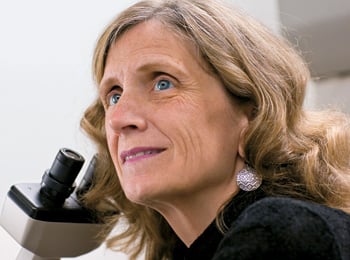No one escapes being affected by cancer. We all know someone, perhaps even a family member who has been diagnosed with cancer. According to the National Cancer Institute, more than 1.6 million people will be diagnosed with cancer in 2012. In fact, it is estimated that each person has a 41% chance of developing cancer during his or her lifetime. But new discoveries by researchers have started to change the outcome of a cancer diagnosis. In a recently published article in Nature, two researchers at CU boulder have found a possible solution hiding at the ends of our DNA. According to Professor Cech, "This is an exciting scientific discovery that gives us a new way of looking at the problem of cancer.” The researchers, Tom Cech and Leslie Leinwand, found the solution by studying how telomerase functions in our cells. In normal people, telomerase helps us keep our cells healthy and young.
Tags: Bioresearch, University of Colorado, Northwest, cancer research, Biofrontiers Institute, Cancer, BioResearch Product Faire Event, CO, Boulder, UCO
At the Wyss Institute for Biologically Inspired Engineering at Harvard University, in the Longwood medical neighborhood in Boston, researchers have reached a biotech milestone with tremendous potential for future drug testing and development. Instead of resorting to animals for testing, they may soon be using a simulated organ that lives on a chip. It has mechanical and biological (cellular) parts, and yes, it breathes, thanks to a vacuum system that pumps air through. The bio-inspired micro-device has gone through several tests recently to assess its accuracy in mimicking the human lung when bacteria or potentially toxic drugs are introduced. Results: Positive. The lung-on-a-chip replicates responses found in animal models and observations of human lung function. Indeed, because the device uses human lung and blood vessel cells, it acts may act more like a lung in a human body than lab animals.
Tags: Northeast, Lab-on-a-chip Technology, 2012, Massachusetts, Cancer, biological, Boston, BioResearch Product Faire Event, MA, Harvard, innovative solutions, Drug Development, Harvard Medical School, bio medical research
Often growing up as a child you hear, “eat your veggies if you want to grow up to be big and strong.” With new research on triple negative breast cancer, that old saying might have to change to "eat your veggies if you want to keep cancer away". Recently, at the 2012 American Association of Pharmaceutical Scientists (AAPS) Annual Meeting, Mandip Sachdeva announced: "We are confident that the compounds we are currently working with are an effective treatment for triple-negative breast cancer. These compounds are safer for the patient than current treatments available".
Tags: Bioscience research, cancer research, Texas A&M University, Texas, 2012, Cancer Treatment, Cancer, College Station, BioResearch Product Faire Event, Texas A&M Research, Texas A&M Life Science Funding, TX, Texas A&M
Cancer research is hot, and the best in the field are hotly-courted by top cancer research centers, often with very attractive compensation packages in addition to state-of-the-art labs and equipment. As if fighting cancer weren't challenging enough, even renowned universities with world-class biomedical programs like the University of California San Diego have had some of their shining stars in the laboratory snatched away by big-money states like Texas in recent years. Not to be outdone or undermined, UCSD has recently engaged in some aggressive recruiting of its own and is proud to announce that two very important players in the cancer research field have joined the Moores Cancer Center faculty: Dr. Napoleone Ferrara (formerly of Genentech) and Dr. Razelle Kurzrock (formerly of MD Anderson at the University of Texas).
Tags: CA, University of California San Diego, cancer research, California, 2012, Cancer Treatment, Cancer, San Diego, UCSD, Biotechnology Vendor Showcase, Cancer Center, BVS
 Dr. J. Lee Nelson (right) has been studying the fascinating phenomenon of microchimerism in the context of autoimmune disorders ever since she joined the Fred Hutchinson Cancer Research Center faculty in 1986. Microchimerism refers to the presence of two distinct sets of cells in one individual and is surprisingly common as a result of cell exchange between mother and child during pregnancy. The numbers of these outside cells is typically small, but Dr. Nelson's research has implicated them in various autoimmune responses, both positive and negative.
Dr. J. Lee Nelson (right) has been studying the fascinating phenomenon of microchimerism in the context of autoimmune disorders ever since she joined the Fred Hutchinson Cancer Research Center faculty in 1986. Microchimerism refers to the presence of two distinct sets of cells in one individual and is surprisingly common as a result of cell exchange between mother and child during pregnancy. The numbers of these outside cells is typically small, but Dr. Nelson's research has implicated them in various autoimmune responses, both positive and negative.
Tags: Fred Hutchinson Cancer Research Center, Washington, Northwest, cell biology, 2012, Cancer, Cell Research, autoimmune disease, Canada, Seattle, Biotechnology Vendor Showcase
The University of Hawaii Cancer Center has successfully renewed its National Cancer Institute (NCI) designation and is on schedule to open its new world-class cancer research and treatment facility near the John A. Burns School of Medicine (JABSOM) in the Kaka’ako district of Honolulu early next year. The Hawaiian biomedical research center is the only NCI-level facility in the Pacific Islands and one of only 66 NCI research organizations in the U.S. The island state may be a tropical paradise and vacation destination in the popular imagination, but there's no doubt that its capital city is also becoming a serious biomedical research magnet as well.
Tags: biomedical research, Bioresearch, Biomedical expansion, University of Hawaii, cancer research, New research facilities, new science wet labs, Southwest, 2012, Hawaii, Cancer, Front Line event, Honolulu, HI, new construction, Cancer Center

ARCHITECT'S RENDERING OF NEW PROTON BEAM THERAPY FACILITY IN ROCHESTER, MINN.(Courtesy of mayoclinic.org)
Tags: Minnesota, 2012, Rochester, Mayo Clinic, Cancer Treatment, Cancer, BioResearch Product Faire Event, MI, Proton, Treatment

